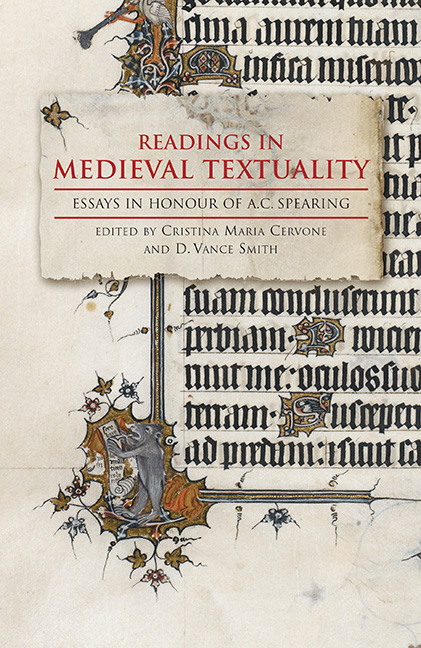Book contents
- Frontmatter
- Contents
- List of Illustrations
- List of Contributors
- A. C. Spearing's Work and Influence
- Bibliography of A. C. Spearing's Works
- I Reading Experience and Experientiality
- II Revisions and Re-visioning of Alliterative Poetry
- 4 Fayre Formez: Vernacular Scriptural Paraphrase and Lay Reading in Cleanness
- 5 Langland's Last Words
- III Subjectivity and the Self
- IV Reading for Form
- V Epilogue
- Works Cited
- Index
- Tabula Gratulatoria
5 - Langland's Last Words
from II - Revisions and Re-visioning of Alliterative Poetry
Published online by Cambridge University Press: 25 October 2017
- Frontmatter
- Contents
- List of Illustrations
- List of Contributors
- A. C. Spearing's Work and Influence
- Bibliography of A. C. Spearing's Works
- I Reading Experience and Experientiality
- II Revisions and Re-visioning of Alliterative Poetry
- 4 Fayre Formez: Vernacular Scriptural Paraphrase and Lay Reading in Cleanness
- 5 Langland's Last Words
- III Subjectivity and the Self
- IV Reading for Form
- V Epilogue
- Works Cited
- Index
- Tabula Gratulatoria
Summary
Dream is the mirror in which the soul sees itself, and in itself sees the image of God.
(A. C. Spearing, Medieval Dream-Poetry)After having spent much of his waking life composing and revising Piers Plowman (though he may also have dreamed a verse or two as well, one imagines), William Langland offers, in Passus 20 of the C-text, lines 350 to 358, the final revised speech of Will in the final revised passus of the final version of his poem. Perhaps it is better to call such revisions “intrusions” into the poem, and Will's words in C.20 do indeed have an intrusive feel, for Will is more than aware here that he has become over-excited in his commentary and that he needs to rein himself in. I want to read this dramatic intrusion in relation to two other significant intrusions in the C-text, Conscience's speech on clerical corruption in C.Prol.95–124 and Will's exposition on the clergy in the Pardon Scene in C.9.255–79 – altogether three instances where, I believe, we come as close as possible to hearing the voice of the poet himself. These are not the only intrusions, large or small, in the complexly revised C-text, all of which repay study, but they do reflect a coherence of attitude and an authorial disposition displayed by the poet in his final moments of creation, composition, and contemplation, however murky the archeological status of the poem's textual history may remain. Seeing these passages as a series of linked and intentional elaborations and as integral parts of Langland's C-text work has a number of implications, and thus my essay has several aims. First, the argument for coherence supports the contention of many scholars that Langland in the C-text increases the intensity and the frequency of direct speech in propria persona. This critical awareness of Langland's voice relates to a productive critical tendency to see Langland as a deeply autobiographical poet, concerned with his own vocation and the nagging question of how he could be at once a poet and also worthy of God's grace, free from a sinful idleness that was ever more targeted as dangerous and associated, in the post-plague labor crisis, with idle “lollers” and wanderers, as Anne Middleton has noted.
- Type
- Chapter
- Information
- Readings in Medieval TextualityEssays in Honour of A.C. Spearing, pp. 65 - 82Publisher: Boydell & BrewerPrint publication year: 2016

